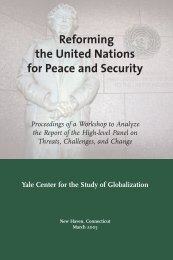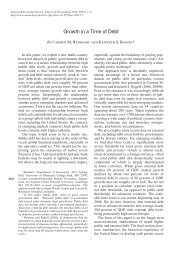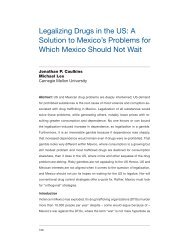The collapse of global trade, murky protectionism, and the crisis:
The collapse of global trade, murky protectionism, and the crisis:
The collapse of global trade, murky protectionism, and the crisis:
Create successful ePaper yourself
Turn your PDF publications into a flip-book with our unique Google optimized e-Paper software.
VOX<br />
Research-based policy analysis <strong>and</strong> commentary from leading economists<br />
which aim at removing <strong>the</strong> obstacles to co-risk sharing <strong>and</strong> co-financing by various<br />
institutions.<br />
<strong>The</strong> efforts by public players to boost <strong>the</strong> supply <strong>of</strong> <strong>trade</strong> finance<br />
One clear lesson from <strong>the</strong> 1997/98 Asian financial <strong>crisis</strong> is that in periods that are<br />
prone to a lack <strong>of</strong> trust <strong>and</strong> transparency, all actors – including private banks (which<br />
account for some 80% <strong>of</strong> <strong>the</strong> <strong>trade</strong> finance market), export credit agencies <strong>and</strong> regional<br />
development banks – should as far as practicable pool <strong>the</strong>ir resources (IMF 2003).<br />
Strong links among <strong>the</strong> various players are also important because <strong>of</strong> an absence <strong>of</strong><br />
comprehensive <strong>and</strong> reliable data on <strong>trade</strong> finance flows. This means that <strong>the</strong> main<br />
channel for making a reasonable assessment <strong>of</strong> <strong>the</strong> market situation is via <strong>the</strong> collection<br />
<strong>of</strong> informed views <strong>and</strong> partial statistics from various institutions. This has been<br />
a key aspect <strong>of</strong> <strong>the</strong> activities <strong>of</strong> <strong>the</strong> WTO Expert Group.<br />
In this <strong>crisis</strong>, <strong>the</strong> response <strong>of</strong> public-backed institutions has been unprecedented<br />
<strong>and</strong> involves three activities.<br />
All regional development banks <strong>and</strong> <strong>the</strong> IFC have doubled on average capacity<br />
under <strong>trade</strong> facilitation programmes since November 2008.<br />
<strong>The</strong>re is some thinking, in <strong>the</strong> context <strong>of</strong> <strong>the</strong> G20, which might fur<strong>the</strong>r increase<br />
<strong>the</strong> size <strong>of</strong> such programmes, in particular by adding some features that would ease<br />
<strong>the</strong> liquidity constraint on small customers. <strong>The</strong> idea <strong>of</strong> setting up limited liquidity<br />
pools for co-financing operations with banks in developing countries are making<br />
progress; such moves would be likely to have a high leverage <strong>and</strong> multiplier effect on<br />
<strong>trade</strong>.<br />
To a large extent, export credit agencies have stepped in, responding positively to<br />
<strong>the</strong> call from governments in <strong>the</strong> fall <strong>of</strong> 2008.<br />
<strong>The</strong>se have been accomplished primarily with programmes for short-term lending<br />
<strong>of</strong> working capital <strong>and</strong> credit guarantees aimed at Small <strong>and</strong> Medium Enterprises<br />
(SMEs). For certain countries, <strong>the</strong> commitment is very large or unlimited in amount<br />
(Germany, Japan). In o<strong>the</strong>r cases, very large lines <strong>of</strong> credit have been granted to secure<br />
supplies with key trading partners (<strong>the</strong> US with Korea <strong>and</strong> China), or to support<br />
regional <strong>trade</strong>, in particular supply-chain operations. To this effect, <strong>the</strong> APEC summit<br />
announced <strong>the</strong> establishment <strong>of</strong> an Asia-Pacific Trade Insurance Network to facilitate<br />
intra- <strong>and</strong> extra- regional flows <strong>and</strong> investment through reinsurance cooperation<br />
among export credit agencies in <strong>the</strong> region. Japan's NEXI is establishing itself as <strong>the</strong><br />
leader <strong>and</strong> main underwriter <strong>of</strong> this collective re-insurance system.<br />
One problem <strong>of</strong>ten underestimated in developing countries is <strong>the</strong> difficulty for<br />
banks <strong>and</strong> importers to find foreign exchange, for example in cases where <strong>the</strong> main<br />
currency <strong>of</strong> transactions (say, <strong>the</strong> Euro or <strong>the</strong> US dollar) has become scarce because <strong>of</strong><br />
<strong>the</strong> depreciation <strong>of</strong> <strong>the</strong> local currency, or because <strong>of</strong> <strong>the</strong> fall in receipts from remittances<br />
<strong>and</strong> exports.<br />
Central banks with large foreign exchange reserves have been able to supply foreign<br />
currency to local banks <strong>and</strong> importers generally through repurchase agreements.<br />
Since October 2008, Brazil's central bank has provided $10 billion to <strong>the</strong> local market.<br />
<strong>The</strong> Korean central bank has pledged $10 billion <strong>of</strong> its foreign exchange reserves<br />
to do likewise. <strong>The</strong> central banks <strong>of</strong> South Africa, India, <strong>and</strong> Indonesia are also<br />
engaged in similar operations. Unfortunately, however, many developing countries<br />
lack foreign exchange reserves <strong>and</strong> are unable to use similar facilities.<br />
78





